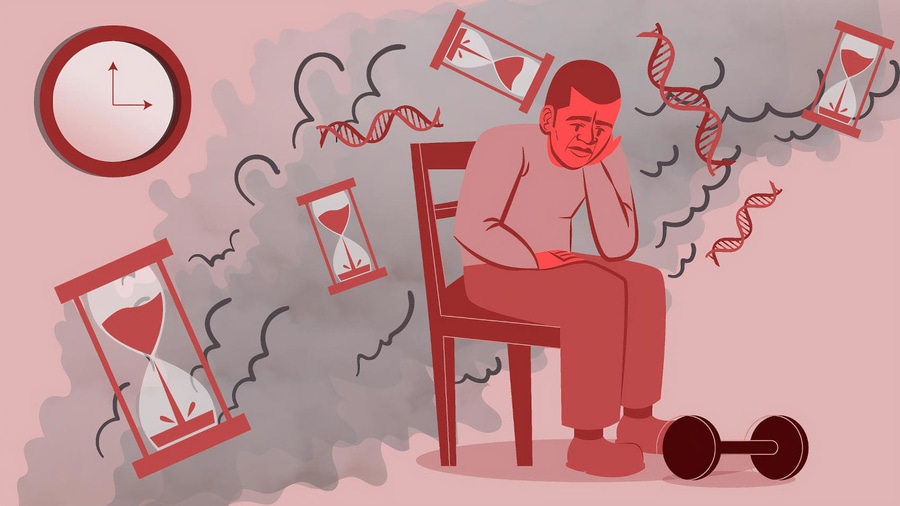
#Industry News
New Research Indicates That Weak Muscles May Speed Up Aging
The study provides some of the first evidence of a link between muscle weakness and acceleration of biological age, according to researchers.
People age at different rates due to a variety of intrinsic and extrinsic factors, which can affect their biological age and their risk of developing diseases or experiencing early death. This is why two individuals who are both 50 years old may not have the same level of biological aging, despite having lived for the same number of years.
Lifestyle choices, such as diet and smoking, and illness all contribute to accelerating biological age beyond one’s chronological age. Researchers have discovered that grip strength, a measure of overall muscle strength, is linked to biological age in this way. In particular, the study, which was published in the Journal of Cachexia, Sarcopenia, and Muscle, found that people with weaker grip strength had older biological ages.
Researchers at Michigan Medicine modeled the relationship between biological age and grip strength of 1,274 middle-aged and older adults using three “age acceleration clocks” based on DNA methylation, a process that provides a molecular biomarker and estimator of the pace of aging. The clocks were originally modeled from various studies examining diabetes, cardiovascular disease, cancer, physical disability, Alzheimer’s disease, inflammation, and early mortality.
Results reveal that both older men and women showed an association between lower grip strength and biological age acceleration across the DNA methylation clocks.
“We’ve known that muscular strength is a predictor of longevity, and that weakness is a powerful indicator of disease and mortality, but, for the first time, we have found strong evidence of a biological link between muscle weakness and actual acceleration in biological age,” said Mark Peterson, Ph.D., M.S., lead author of the study and associate professor of physical medicine and rehabilitation at the University of Michigan.
“This suggests that if you maintain your muscle strength across the lifespan, you may be able to protect against many common age-related diseases. We know that smoking, for example, can be a powerful predictor of disease and mortality, but now we know that muscle weakness could be the new smoking.”
The real strength of this study was in the eight to 10 years of observation, in which lower grip strength predicted faster biological aging measured up to a decade later, said Jessica Faul, Ph.D., M.P.H., a co-author of the study and research associate professor at the U-M Institute for Social Research.
Past studies have shown that low grip strength is an extremely strong predictor of adverse health events. One study even found that it is a better predictor of cardiovascular events, such as myocardial infarction, than systolic blood pressure – the clinical hallmark for detecting heart disorders. Peterson and his team have previously shown a robust association between weakness and chronic disease and mortality across populations.
This evidence coupled with their study’s recent findings, Peterson says, shows potential for clinicians to adopt the use of grip strength as a way to screen individuals for future risk of functional decline, chronic disease, and even early mortality.
“Screening for grip strength would allow for the opportunity to design interventions to delay or prevent the onset or progression of these adverse ‘age-related’ health events,” he said. “We have been pushing for clinicians to start using grip strength in their clinics and only in geriatrics has this sort of been incorporated. However, not many people are using this, even though we’ve seen hundreds of publications showing that grip strength is a really good measure of health.”
Investigators say future research is needed to understand the connection between grip strength and age acceleration, including how inflammatory conditions contribute to age-related weakness and mortality. Previous studies have shown that chronic inflammation in aging – known as “inflammaging” – is a significant risk factor for mortality among older adults. This inflammation is also associated with lower grip strength and may be a significant predictor of the pathway between lower grip strength and both disability and chronic disease multimorbidity.
Additionally, Peterson says, studies must focus on how lifestyle and behavioral factors, such as physical activity and diet, can affect grip strength and age acceleration.
“Healthy dietary habits are very important, but I think regular exercise is the most critical thing that somebody can do to preserve health across the lifespan,” he said. “We can show it with a biomarker like DNA methylation age, and we can also test it with a clinical feature like grip strength.”
References: “Grip strength is inversely associated with DNA methylation age acceleration” by Mark D. Peterson, Stacey Collins, Helen C.S. Meier, Alexander Brahmsteadt and Jessica D. Faul, 9 November 2022, Journal of Cachexia, Sarcopenia, and Muscle.
DOI: 10.1002/jcsm.13110
“DNA methylation patterns reflect individual’s lifestyle independent of obesity” by Ireen Klemp, Anne Hoffmann, Luise Müller, Tobias Hagemann, Kathrin Horn, Kerstin Rohde-Zimmermann, Anke Tönjes, Joachim Thiery, Markus Löffler, Ralph Burkhardt, Yvonne Böttcher, Michael Stumvoll, Matthias Blüher, Knut Krohn, Markus Scholz, Ronny Baber, Paul W Franks, Peter Kovacs and Maria Keller, 12 June 2022, Clinical and Translational Medicine.
DOI: 10.1002/ctm2.851
“Prognostic value of grip strength: findings from the Prospective Urban Rural Epidemiology (PURE) study” by Dr. Darryl P Leong, Ph.D., Prof Koon K Teo, Ph.D., Sumathy Rangarajan, MSc, Prof Patricio Lopez-Jaramillo, Ph.D., Alvaro Avezum Jr, MD, Andres Orlandini, MD, Pamela Seron, MSc, Suad H Ahmed, Ph.D., Prof Annika Rosengren, MD, Prof Roya Kelishadi, MD, Prof Omar Rahman, DSc, Sumathi Swaminathan, Ph.D., Romaina Iqbal, Ph.D., Rajeev Gupta, Ph.D., Prof Scott A Lear, Ph.D., Prof Aytekin Oguz, MD, Prof Khalid Yusoff, MBBS, Katarzyna Zatonska, MD, Jephat Chifamba, MPhil, Prof Ehimario Igumbor, Ph.D., Viswanathan Mohan, Ph.D., Ranjit Mohan Anjana, MD, Hongqiu Gu, Ph.D., Prof Wei Li, Ph.D. and Prof Salim Yusuf, DPhil, on behalf of the Prospective Urban Rural Epidemiology (PURE) Study investigators, 13 May 2015, The Lancet.
DOI: 10.1016/S0140-6736(14)62000-6
The study was partly funded by the National Institutes of Health.
